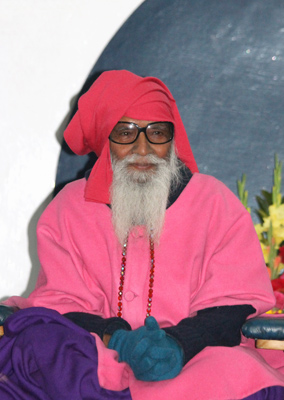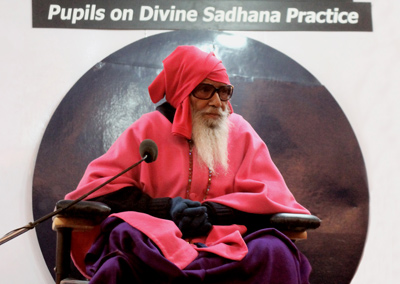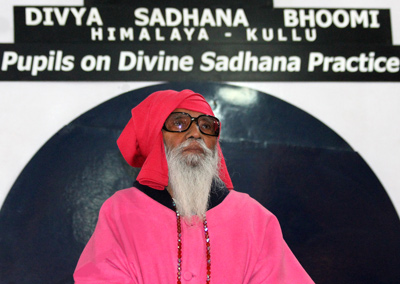It Is Only

Julie: …[You said something like] “Unless you succeed in knowing that viparyay buddhi (the intellect, whose knowledge is opposite to Self) —which makes a human being, his mind, emotions and world to be true—does not exist, you will not attain your Self, which is Pure Free Forever. ...
Swamiji: For all intellectuals, this knowledge is a great help, because every intellectual knows, through viparyay buddhi, that he is a person. In truth, the person was never born: there is only Self. It is not the fault of a child who is born, because he does not come with viparyay buddhi. Yet the moment he is born, that imaginary ego-intellect-mind becomes obvious. Thus, a human child always remains the ego-intellect-mind-senses—or viparyay buddhi. In sleep, why is viparyay buddhi not there in him?
This knowledge is a help for a human being, who has the ego-intellect-mind, viparyay buddhi, or the senses and the body. He can succeed in knowing that he is free from viparyay buddhi if he does not admit it to be true. That is all. That is called his sannyas (renounced) state, which means that he has unity with Pure Sat (Existence) and has renounced asat (non-existence), or the ego-intellect-mind. So the ego-intellect-mind is viparyay. Viparyay means changing: it appears, it is and it disappears.
This knowledge is a help when someone is intellectual. Everybody is intellectual. Thus, you cannot explain why the ego-intellect-mind comes. Why? You are that, so why would you be able to explain anything other than ego-intellect-mind? That is why in satsang it is easy for those persons who have the ego-intellect-mind to know that it was never there to tell you that you are a person. Knowing this, you remain that which is Pure.
Do you know what to do now? A child is born. The moment a child is born, all the senses are there. Wherever a child is born, the child will describe that to others. She will say, “I am born to so-and-so. I am her daughter. I am the daughter of whatever she was doing. I have learned all the things that she taught me.” Throughout your lifetime, you will say this. You will say it even when you realize. If I ask you to say something, you will tell me the same thing. You cannot say anything else but name and form. When you talk of name and form, still you can know that name and form was never there. Name and form is your individual self, so you cannot leave it until death. But if you realize, you will use your name, form and whatever you have learned, you will continue using all that, but leaving inside and outside, you will remain Free, Pure. Then you will realize that Self has nothing to do with birth, or with death, or with living. Then, Self alone remains.
This is how an intellectual can be approached. He can be approached, but he cannot leave the ego-intellect-mind, he has to speak the same thing. She cannot say, “I am not Julie,” yet from her very childhood, “Julie” was never there. How did the form and name “Julie” become one? The form was not there, but the form is now being called Julie, the name—which is fictitious. That means that as the form also began to say it is Julie, so the form is also fictitious.
Form and name both taken together are a form. The form appears to a mother. It appears to her that the form is, so she cannot do anything else but see the form. Some mother knows that the form was never there. Why should she say that the form is when it was never there? As soon as the form comes, see how quickly she becomes a mother. Before that, she was never a mother, she was still a child. The moment the form comes, she is a mother, and the child is a form. Both became form, and then form goes on, duality goes on—mother and dolly.
In order to realize, you are supposed to leave both name and form. But you cannot leave them, because by now duality is matured, and it is visible to the senses. As long as you have senses and you know that the senses exist, you have to die. Even if you say, “I don’t care about death, I don’t care about death,” that means you care about death. [Laughter]
 Aatma: Swamiji, when you say that as long as you have senses you have to die, how does one not have senses? We use the senses.
Aatma: Swamiji, when you say that as long as you have senses you have to die, how does one not have senses? We use the senses.
Swamiji: This is what I am saying, you have never been the senses. But you ask how not to have senses.
Aatma: Well, when I am using my senses…
Swamiji: No, you are not using your senses.
Aatma: So when my eyes are seeing, what is happening?
Swamiji: That is why you are a human being. Why do my eyes not see you? I have eyes and you also have eyes. But my sankalp (imagination) is Satya, Truth. When I use sankalp to let you know that you can hear Me, then you become Me. You become Aatma and Me as one: Satya sankalp. It is like the dream: when you wake up, you cancel it, it does not exist. We are already dreaming in the waking state, but Satya is not the dream, Satya is not the waking state. The moment that Satya has imagination, then we are a dreamer or a waker. That is why we know each other. This goes on. But when this knowledge of each other does not exist, that is the Self.
It is good that you came to know that the ego-intellect-mind does come. You have to work, and you have to establish that the ego-intellect-mind is working—whereas there is no ego-intellect-mind, it is only the Self throughout. The Self is not even born. But now, here I have to become quiet. For how can you ever think that you are not born? So I restrain. What do I say? You are born and I am born. You can identify with this. You can recognize this. This recognition is the experience of two. And experience does not exist! So a human being is an experience of birth, or of the waking state, or of the dream state, or of the deep sleep state.
Gayatri: Swamiji, then that experience which we experience is not the same as anubhav [ordinarily used by Swamiji to indicate Self, or Pure Experience]?
Swamiji: I began to speak of anubhav, which is a Hindi word. Experience and anubhav are just the same. Anubhav is also not there, otherwise hearing about it all these years, you would have realized by now. [Laughter] First of all I say, “You are anubhav” so that you should remain confused—that you are not this form, you are not that form, you are not this name, you are not that name. “But how,” you say, “am I not this name and form? I have anubhav of it.” I answer, “No, no, anubhav is not gold, not silver. But a person is skin and bones, all those things, or matter. Anubhav is not matter.” First of all, I have to say this. But when you realize that anubhav is there and this name and form is not, then you have again made a separation, and I have to finish that. Then I will say that anubhav is also not there. Then you will ask, “What is that?!” Then I will come down to your understanding and say, “Self alone is.” [Laughter] Self also does not exist. Knowledge does not exist. Ignorance does not exist. Then you will ask, “What is that which are you saying?!” Then I will answer, “Vision alone is.” Vision is Self.
That is how human beings can become uninvolved from this ignorance. But they cannot get beyond that. They will be stuck in vision. Then there is vision and not-vision—two remain. Ultimately, to such a person who has reached there I say it is Indivisibility—no division of vision and not-vision. Then it is akhand, without any parts, without two, without adwait and dwait, without one and two.
There are scholars who have translated that Space as adwait, or “One without a second.” They call it “The Self-realized state, One without a second.” And a human being is happy to aspire for that—and die. Even if you are Self-realized, you are still caught. But then our sages and saints spoke of Janak Videh. There was King Janak, but he was videh—videh means no body at all. How can that be possible for you? [Some in the audience point to Swamiji, indicating he has reached videhamukti, liberation without body.] You are indicating me: “You are videhamukt,” and for you “you” means a form. Again. When forms do not exist, that is the Self.
That is why when you meditate you can watch that form is not there. But the moment you open the eyes, you are the same person, with name and form. This is the same for the majority, which means all seven billion people. Immediately you say, “Yes, seven billion people.” But where were they a hundred years ago? In order to reach there, meditation alone is your reference: for truth, for knowledge, for love. We use these words, all three: truth, knowledge and love, or Sat-Chit-Anand.
 Anand is only love. As soon as a mother sees her child, anand appears. But this anand is called form-anand. When anand appears, it has nothing to do with the child and the mother. For people who can understand this, we also have to define anand, so we say it is Pure Anand, Paramanand (Supreme Love), Ishwaranand (God’s Love), Paramatmanand (Supreme Self’s Love), because somewhere you have to satisfy that person who still has inquiry.
Anand is only love. As soon as a mother sees her child, anand appears. But this anand is called form-anand. When anand appears, it has nothing to do with the child and the mother. For people who can understand this, we also have to define anand, so we say it is Pure Anand, Paramanand (Supreme Love), Ishwaranand (God’s Love), Paramatmanand (Supreme Self’s Love), because somewhere you have to satisfy that person who still has inquiry.
Where there remains no inquiry, it is Siddhant (Principle). You became siddh (perfect). Siddh indicates no word, yet you say, “He is a successful person, he is a siddh person, he is a perfect person, he is a highly aware person.” On the word level, this will always remain. Whenever you have to speak, you have to do the same thing—use name and form and whatever you have learned. There is nothing wrong with it. Otherwise, why should I ask Shiv Nath to speak something? He has to say “I am the son of Paula and Jack, and the brother of so-and-so.” He says what they did, what he has learned, and all that.
But the Space has nothing to say. When I say you are nothing but the Space, I am contracting that bulk with form and name. When you say, “Well, it’s too difficult Swamiji, I can’t,” then I say, “Fine. Then do it when you die.” Immediately, you come to know that a dead man has nothing to do with I and you, with realization or no realization, with up and down, with science and no science. Then why do you have to die and say “I will be dead then,” why don’t you now? If you do, there is no experience of death, no anubhav. You see a dead man, so you know it. “You know it” means that you are already dead, so then you are born: you are the Space first, then you got wrapped up in a ball. That is the state. …
This is a very unusual kind of space that you are hearing. In the world, nobody can hear about death when he is alive. When he is alive, you cannot say that life is death. He will say, “No, death and life are two separate things. Life is separate and death is separate.” How can that be possible when you are not born? Only when you are born is there life and death—duality.
So I make you hear your own truth. If you become that, very good. If you do not, then continue, there is nothing wrong. But there are some persons among you who want to be free even from life and death. How would you? You are not born, so how would you know freedom if you are not bound? …
Just keep understanding for yourself, “I am unborn, unchanging, undying.” That is what you can practise. If at all you ask, “What should I do?” then practise this. See whether it works or not. When it starts working, you will say, “Yes, Guru is right.” …
Speech, hearing and seeing—these three senses are working for a human being. All three senses make you a human being, and we have to use them to annihilate them—which a human being will not like. He will say, “No, I want to have these things.” And these things do not remain at the time of death: you cannot speak, you cannot hear, you cannot see. Just the body remains. So what is the fault of the body? … Only the senses make you a human being, and they are imaginary. You say, “No. I have to become a creative imaginator. I have to become creative intelligence.” Imagination you call intelligence! That is a human being.
After that, we meditate. Close your eyes. After all those talks, we had to reach here. Here, all the senses are not making this as a subject or an object. It is totally free. That too I use the word “free,” but no, it is forever: free is against bound, bound is against free. They are all in dwait, in the sense of duality. And this place, this is neither adwait nor dwait. It is only…Copyright © 1999-2015 International
Meditation Institute. All Rights Reserved